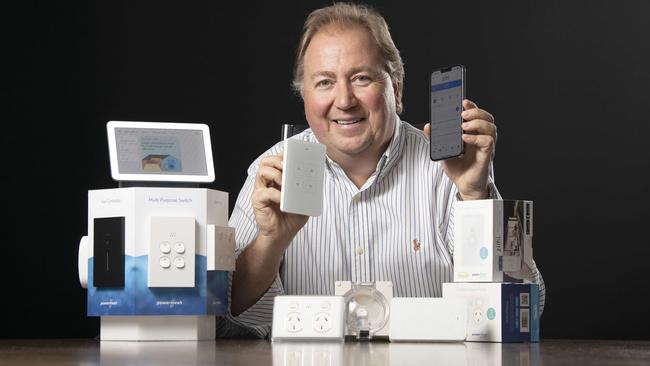Simon Gerard looking to replicate Clipsal’s success with connected home player Zimi
Simon Gerard, whose family developed Clipsal into a world-leading company, believes listed player Zimi, which he chairs, can be a big player in the home automation space.

More than 100 years after his great grandfather Albert Gerard founded the iconic Clipsal brand, Simon Gerard is looking to take home automation to the next level through listed vehicle Zimi.
Mr Gerard is chair of the company which has a tech team working out of the Gold Coast and has developed a range of connected switches which allow users to control electrical devices in the home, monitor their energy usage, and automate home processes through an app.
The company was also recently granted an innovation patent for technology it has developed, which allows developers or builders to hand over control of smart devices pre-configured, simply by scanning a QR code.
That technology is already in use in a 275 unit block, Liberty One, in Footscray, Victoria, the company said in its latest quarterly update.
Zimi is now preparing to launch its range of connected smoke detectors, and says it has more than 20,000 devices paired at the moment, with record growth in recent months.
Mr Gerard said that through pairing Zimi’s cloud technology with Amazon’s Alexa or Google’s Nest, or by using the company’s own app, customers could automate their homes.
“Everyone is going to get connected - what we want to do, is do it very simply,’’ Mr Gerard said.
“Our homegrown specialty is controlling lights. If you want to control lights, you need to do it at the switch.’’
Mr Gerard said smart light globes were effectively a gimmick, because they were not useful at scale - think of a light fitting involving several expensive smart globes, or a whole house with a large number.
“And when you turn the light switch off the smart bulb becomes a dumb bulb,’’ he said.
Using Zimi switches, which are easily installed by licenced electricians, a whole house or commercial site worth of lights, or any plug-in device, can be controlled.
The technology works across all electrical devices, with Zimi for example working with Australia’s largest garage door manufacturer Steel-Line, with Zimi switches able to make every garage door a connected device.
“We’ve brought a connected experience to the electrical community like no other. It’s simple, it’s retrofitable, it’s scalable and it’s very cost-effective,’’ Mr Gerard said.
“Our technology, we can take the switch off the wall, replace it, pair it up to your phone and bring a connected experience to that device.
“The app is very simple, the pairing process is very simple, and behind each one of our hardware devices we’re collecting the energy usage data.’’
This was useful not only for monitoring energy usage, but also for getting alerts should a device fail, or if a device is left on in the home, which can then be turned off remotely.
Geofencing capability could also prompt a user, alerting them to the fact that they’ve left a device on in the home after they have left the area.
“We’re harvesting all of that data, and we’re going to start to explore AI,’’ Mr Gerard said.
This could alert users to issues such as the fact that they are running lights too long, or heaters inefficiently.
The technology uses Bluetooth to connect, which was crucial Mr Gerard said, because it meant devices could be configured before internet connections were installed, which usually happened after handover from builders.
Zimi is still in the investment phase, Mr Gerard said, with the market capitalisation still currently just more than $5m.
The company recently raised $1.5m through an issue to sophisticated and institutional investors.
“All of this has been homegrown, in Australia, by really smart Australians and we’ve built something here that is world-class,’’ Mr Gerard said.
Zimi has distribution through retailers such as Harvey Norman and Beacon Lighting, as well as distribution through GSM Electrical’s Trader brand which supplies electrical wholesalers.
The Gerard family developed Clipsal into a leading international electrical products company after it was founded in Adelaide in 1920.
The family sold the business to Schneider Electric in 2003 for about $750m.




To join the conversation, please log in. Don't have an account? Register
Join the conversation, you are commenting as Logout